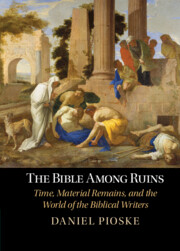Book contents
- The Bible Among Ruins
- The Bible Among Ruins
- Copyright page
- Dedication
- Contents
- Figures
- Preface
- Acknowledgments
- Introduction
- One On Ruins, Then and Now
- Two Shiloh and the Ruins of Memory
- Three The Ruins of Rachel’s Tomb and the Presence of the Past
- Four Jerusalem and the Ruins of Tomorrow
- Conclusion
- Bibliography
- Subject Index
- Scripture Index
Four - Jerusalem and the Ruins of Tomorrow
Published online by Cambridge University Press: 11 October 2023
- The Bible Among Ruins
- The Bible Among Ruins
- Copyright page
- Dedication
- Contents
- Figures
- Preface
- Acknowledgments
- Introduction
- One On Ruins, Then and Now
- Two Shiloh and the Ruins of Memory
- Three The Ruins of Rachel’s Tomb and the Presence of the Past
- Four Jerusalem and the Ruins of Tomorrow
- Conclusion
- Bibliography
- Subject Index
- Scripture Index
Summary
The third and last case study of this book centers on how ruins are experienced foremost as indicating something about the future in the Hebrew Bible. To explore this prospective sense of ruination, it examines the many biblical references to the destruction of Jerusalem by the Neo-Babylonian Empire in 586 BCE, both in terms of the impending ruin of the city and the hope that one day it would be in ruins no more.
- Type
- Chapter
- Information
- The Bible Among RuinsTime, Material Remains, and the World of the Biblical Writers, pp. 203 - 252Publisher: Cambridge University PressPrint publication year: 2023

